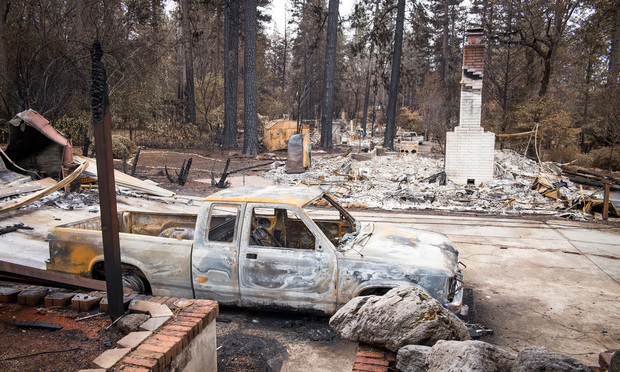PG&E Bankruptcy May Spark Fight With Lawyers for Wildfire Victims
“It's possible there's enough assets to pay everybody off," said Mike Danko of Danko Meredith.
January 23, 2019 at 06:51 PM
7 minute read
The original version of this story was published on The Recorder
 A burned-out vehicle in Paradise, California, U.S., on Nov. 26, 2018. (Photo: David Paul Morris/Bloomberg)
A burned-out vehicle in Paradise, California, U.S., on Nov. 26, 2018. (Photo: David Paul Morris/Bloomberg)
Lawyers representing wildfire victims with claims against PG&E are gearing up for a big fight in bankruptcy court, though not all of them agree on the best strategies going forward.
PG&E Corp., the San Francisco-based utility, announced last week that it plans to file for Chapter 11 reorganization on Jan. 29, citing potentially more than $30 billion in legal liabilities associated with deadly wildfires in Northern California in 2017 and 2018. The most recent of those, the Camp Fire, killed 86 people and destroyed more than 18,000 properties, according to PG&E's filings with the U.S. Securities and Exchange Commission.
Hundreds of lawsuits are now in limbo. But lawyers representing wildfire victims are optimistic that a bankruptcy won't extinguish the possibility that their clients would get fair compensation.
“It's definitely not 'Oh my God, they filed bankruptcy, we're out of luck!'” said Mike Danko, whose firm, Danko Meredith, represents 1,000 victims of the Camp Fire.
Many viewed a bankruptcy as strategic and political and were skeptical about PG&E's $30 billion estimate in legal liabilities.
“You've got $2 billion in insurance coverage, $12 billion of assets on the gas side, $3 billion in your buildings, your assets, plus you're cranking out $1.5 billion a year running operations,” Danko said. “It's possible there's enough assets to pay everybody off.”
PG&E, which has retained Weil Gotshal & Manges and Cravath, Swaine & Moore on bankruptcy matters, said a Chapter 11 filing was the “only viable option” to resolve “extensive litigation and significant potential liabilities resulting from these wildfires.”
“We fully appreciate the devastation that our customers faced in the Northern California wildfires,” said spokesman James Noonan. “Chapter 11 provides a court-supervised process for fairly and efficiently assessing and resolving our wildfire liabilities. The process will allow us to fully consider these claims and, if PG&E is found to be responsible for them, the process will ensure claimants receive compensation in a fair and efficient manner.”
At issue are lawsuits brought over several recent wildfires. In SEC filings, PG&E estimated there were about 50 complaints brought on behalf of 2,000 individuals affected by the Camp Fire, including six class actions. Another 700 lawsuits, including five class actions, represent 3,600 victims of a series of wildfires in California's North Bay Area region in 2017 that killed 44 people and destroyed 8,900 structures. Lawyers say the bankruptcy also could impact 1,000 individuals with 80 complaints brought over the Butte Fire in 2015.
Counties and cities also have sued over costs associated with the wildfires, as have PG&E's insurance companies and shareholders.
Lawyers are in the process of working out who would represent wildfire victims on an anticipated creditors' committee. Most lawyers are optimistic that a bankruptcy could give them the information they need to prove that PG&E has enough assets to go around.
“The only way to get to the truth is get to the financial records,” said Frank Pitre, of Cotchett, Pitre & McCarthy. “Without that information, nobody is making any prediction on whether anybody has to compromise a nickel. We're all sitting down and trying to evaluate those things.”
What's unclear is what path the claims could take once in bankruptcy.
“There's common talk about whether or not there's going to be some sort of trust fund set up, or a settlement resolution process through the bankruptcy court,” said Brian Kabateck of Kabateck LLP. “There's a lot of unknowns right now.”
The first big fight could be to get a federal judge to grant relief from the automatic stay that bankruptcy will have on their cases, most of which are in San Francisco County Superior Court and Sacramento County Superior Court. The move is a long shot, but, in some cases, lawyers have spent several years on discovery and dozens of depositions and already are prepping for a Butte Fire trial in April and a North Bay fires trial in September.
Going forward with trials, lawyers say, would provide some guidance on how to value the wildfire victim claims.
“The likelihood there will be relief of stay is almost 100 percent,” said Kabateck, who represents 40 families planning to sue over the Camp Fire. “It's just a question of what it will look like.”
The bankruptcy judge could send the cases back to state court for trials, although most likely delayed for at least six to eight months, he said.
But getting relief from a bankruptcy stay is difficult, said James Frantz of Frantz Law Group, who represents 1,700 wildfire victims with claims against PG&E, some of whom have yet to file lawsuits. Going to trial is unpredictable: Even if a jury awards a verdict, there is no guarantee that PG&E would pay the entire amount.
He said he was more inclined to remain in the bankruptcy court, noting that many victims have lost loved ones or their homes and need immediate relief. Many of his clients are living in tents and encampments.
“It's best just to get this behind them as soon as possible, and this might be the only forum to do that,” he said. “We're cautiously optimistic that at the end of the day we'll be able to take care of these victims through this bankruptcy proceeding.”
Further, a bankruptcy judge would take control over PG&E, which has not maintained its equipment and has continued to prioritize profits over safety, he said.
Then there's lawyers who have reached settlements with PG&E. Some want PG&E to honor agreements it reached with some of the Butte Fire victims. On Jan. 17, Sacramento County Superior Court Judge Allen Sumner ordered PG&E to state whether it intended to follow through with payments on those settlements. Lawyers got a Jan. 22 letter from PG&E counsel Kristen Bird at Quinn Emanuel Urquhart & Sullivan stating, “The company's goal is to pay invoices and other commitments as they come due prior to a Chapter 11 filing. However, PG&E cannot commit that all invoices and other commitments will be paid as such obligations come due given its liquidity constraints.”
That means “they don't know,” said Dario de Ghetaldi, who represents 18 individuals from nine families with settlements.
“We have some that PG&E is supposed to pay tomorrow, and we don't know whether they're going to, and we have others they're supposed to pay next week,” said de Ghetaldi, of Corey, Luzaich, de Ghetaldi & Riddle. “There are other settlements PG&E has agreed to but is not telling the lawyer or the parties in those cases whether they're going to get paid.”
This content has been archived. It is available through our partners, LexisNexis® and Bloomberg Law.
To view this content, please continue to their sites.
Not a Lexis Subscriber?
Subscribe Now
Not a Bloomberg Law Subscriber?
Subscribe Now
NOT FOR REPRINT
© 2025 ALM Global, LLC, All Rights Reserved. Request academic re-use from www.copyright.com. All other uses, submit a request to [email protected]. For more information visit Asset & Logo Licensing.
You Might Like
View All
Some Thoughts on What It Takes to Connect With Millennial Jurors

Litigators of the Week: A Knockout Blow to Latest FCC Net Neutrality Rules After ‘Loper Bright’
Trending Stories
- 1Thursday Newspaper
- 2Public Notices/Calendars
- 3Judicial Ethics Opinion 24-117
- 4Rejuvenation of a Sharp Employer Non-Compete Tool: Delaware Supreme Court Reinvigorates the Employee Choice Doctrine
- 5Mastering Litigation in New York’s Commercial Division Part V, Leave It to the Experts: Expert Discovery in the New York Commercial Division
Who Got The Work
J. Brugh Lower of Gibbons has entered an appearance for industrial equipment supplier Devco Corporation in a pending trademark infringement lawsuit. The suit, accusing the defendant of selling knock-off Graco products, was filed Dec. 18 in New Jersey District Court by Rivkin Radler on behalf of Graco Inc. and Graco Minnesota. The case, assigned to U.S. District Judge Zahid N. Quraishi, is 3:24-cv-11294, Graco Inc. et al v. Devco Corporation.
Who Got The Work
Rebecca Maller-Stein and Kent A. Yalowitz of Arnold & Porter Kaye Scholer have entered their appearances for Hanaco Venture Capital and its executives, Lior Prosor and David Frankel, in a pending securities lawsuit. The action, filed on Dec. 24 in New York Southern District Court by Zell, Aron & Co. on behalf of Goldeneye Advisors, accuses the defendants of negligently and fraudulently managing the plaintiff's $1 million investment. The case, assigned to U.S. District Judge Vernon S. Broderick, is 1:24-cv-09918, Goldeneye Advisors, LLC v. Hanaco Venture Capital, Ltd. et al.
Who Got The Work
Attorneys from A&O Shearman has stepped in as defense counsel for Toronto-Dominion Bank and other defendants in a pending securities class action. The suit, filed Dec. 11 in New York Southern District Court by Bleichmar Fonti & Auld, accuses the defendants of concealing the bank's 'pervasive' deficiencies in regards to its compliance with the Bank Secrecy Act and the quality of its anti-money laundering controls. The case, assigned to U.S. District Judge Arun Subramanian, is 1:24-cv-09445, Gonzalez v. The Toronto-Dominion Bank et al.
Who Got The Work
Crown Castle International, a Pennsylvania company providing shared communications infrastructure, has turned to Luke D. Wolf of Gordon Rees Scully Mansukhani to fend off a pending breach-of-contract lawsuit. The court action, filed Nov. 25 in Michigan Eastern District Court by Hooper Hathaway PC on behalf of The Town Residences LLC, accuses Crown Castle of failing to transfer approximately $30,000 in utility payments from T-Mobile in breach of a roof-top lease and assignment agreement. The case, assigned to U.S. District Judge Susan K. Declercq, is 2:24-cv-13131, The Town Residences LLC v. T-Mobile US, Inc. et al.
Who Got The Work
Wilfred P. Coronato and Daniel M. Schwartz of McCarter & English have stepped in as defense counsel to Electrolux Home Products Inc. in a pending product liability lawsuit. The court action, filed Nov. 26 in New York Eastern District Court by Poulos Lopiccolo PC and Nagel Rice LLP on behalf of David Stern, alleges that the defendant's refrigerators’ drawers and shelving repeatedly break and fall apart within months after purchase. The case, assigned to U.S. District Judge Joan M. Azrack, is 2:24-cv-08204, Stern v. Electrolux Home Products, Inc.
Featured Firms
Law Offices of Gary Martin Hays & Associates, P.C.
(470) 294-1674
Law Offices of Mark E. Salomone
(857) 444-6468
Smith & Hassler
(713) 739-1250








